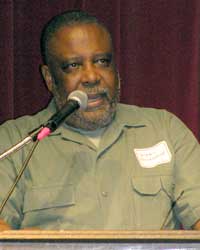Strategic role of Black labor
Published May 19, 2006 10:28 PM
|
Saladin Muhammad
WW photo
|
The system of national oppression is anchored by African-American national
oppression; not because it was the first experience of national oppression in
what became the United States-we know that the Native peoples were the first. It
is because of the role that Black labor has played in the historical development
of U.S. capitalism, as the economic base for the institutionalized racist
political superstructure, and for the consolidation of white supremacy as an
expression of white national social consciousness.
There can be no real
revolutionary working class unity without a consistent struggle against African
American national oppression. However, the African Amer ican liberation movement
must have an internationalist character, so that it helps the African American
masses to see immigrant workers as their allies in a struggle against the same
system of national oppression.
White workers whose political conscious
ness is also shaped by bourgeois democracy and white supremacy, which is further
encouraged by the trade unions, see these voting blocks of oppressed
nationalities as a threat to white skin privilege, and associate its diminishing
character with the increased immigration of Latinos and the social programs won
by the African American struggles of the 1960s and 1970s, which racists claim is
the reason for the U.S. government debt crisis.
The Latino
communities’ call and massive mobilization for a general strike and
boycott on May Day was very significant. It made the issue of mobilizing working
class power a central component of the Latino struggle against national
oppression. This can help set the tone for other struggles against national
oppression and hopefully the trade union movement -which has become weakened by
its failure to exercise power as a working class, as was shown during the PATCO
strike in 1981 and more recently in the New York transit-workers
strike.
How to unite the masses into a revolutionary anti-imperialist
movement is a continuing question facing the revolutionary struggle in this
country. Should it take the form of a multi-national struggle of workers and
oppressed nations against U.S. imperialism, or as a multi-racial working class
struggle? The failure to support the right of self-determination of oppressed
nationalities has been a major impediment to building revolutionary working
class unity.
This raises the question about the role of conscious
political forces-revolutionaries-in the spontaneous national movements. Too
often, there has been a practice of mainly trying to recruit from the
spontaneous movements into the revolutionary organizations, with little or no
effort to help organize the working class leadership and organizing capacity of
the national movements.
The working class of the oppressed nationalities
must be organized to popularize the slogan of self-determination within the
national movements.
The strategic alliance between African American and
Latino national movements must be concrete and built around real struggles that
are able to help both communities and the broad movements for social justice see
the strategic importance. That is why itso important to focus this alliance
today around the struggle for Reconstruction in the Gulf Coast and the struggle
for immigrant rights.
—Saladin Muhammad, chair,
Black Workers for Justice; Black Workers League, Raleigh
Articles copyright 1995-2012 Workers World.
Verbatim copying and distribution of this entire article is permitted in any medium without royalty provided this notice is preserved.
Workers World, 55 W. 17 St., NY, NY 10011
Email:
[email protected]
Subscribe
[email protected]
Support independent news
DONATE


